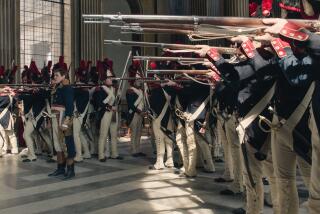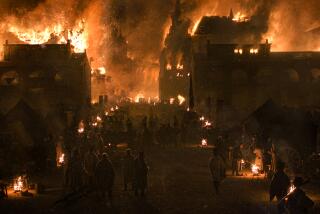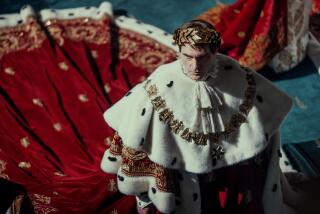In ‘Napoleon’s Last Battle,’ Devil Is in the Historical Details
- Share via
Those who forget the past are doomed to repeat it. So you can’t fault military buffs for reliving epoch-changing battles on their desktops every day. Robert Waters, a producer at Breakaway Games and the force behind Strategy First’s “Waterloo: Napoleon’s Last Battle” for the PC, discussed life on the front lines.
Q: How preoccupied with the past must a war game designer be?
A historical game designer must know the subject he’s designing a game for. So in that sense, he must be very preoccupied with the past.
Q: If we contacted your high school history teachers and mentioned your role in this project, what would their reactions be?
Well, if they remember me at all, they probably wouldn’t be too surprised.
Q: How can the uninitiated tell a solid war game from a weak one?
I’m not sure it’s possible for the uninitiated to tell a solid war game from a weak one. We all bring our own sense of what feels right to a game when we play it. It’s probably universally accepted that a soldier with a gun would Robert Waters
have an advantage in battle against a soldier with a sword. I suppose that if certain things in a war game were to violate a person’s basic precepts about military technology, then he/she might get a feeling that the game doesn’t make sense.
Q: Do those 200-page manuals really contain that much useful information?
It can, if it’s written and organized well enough. Computer war games tend to have larger manuals than non-war-game titles, but that’s because war gamers expect to be given more information about how the game functions internally. But the goal of any manual, whether it be large or small, is to relieve stress. If a manual gets the player moving in the right direction, gives the player good information about how and why to do this or that in the game, then the manual has succeeded.
Q: Some say simulations like these offer true insight into all of a battle’s possible outcomes. Do you concur?
Yes, for the most part. No war game can ever simulate perfectly all the variables that go into a battle, no matter how badly we want it to. Simply put, a game is a game, and it will never simulate reality that closely. But it can give you a good sense of how a certain type of warfare--such as Napoleonic warfare--worked. And for that, I think war games are excellent training tools.
Q: Must someone in your shoes spend hours wading knee-deep in historical records?
A game designer should research fully his subject matter, yes. And this often requires knee-deep research. If a war game doesn’t at least partially simulate real-world statistics and results, then the war gaming community will call you out on the carpet.
Q: How can full-scale conflicts be simulated from all angles?
Well, usually how it works is that a war game designer will research a topic and then design a game taking into consideration all things such as terrain, supply, unit morale, etc. These factors will often adjust the effectiveness of the armies in the field. For example, if it had rained the night before--as it did the night before the Battle of Waterloo--how effective would the artillery be in the battle? Napoleonic artillery fired a ball that would bounce along the ground. Since it had rained, the ground was soft, and so the cannonballs would not bounce as far or as accurately. It’s these kinds of things that will be compiled by the game designer to try to simulate real-world events.
Q: Personal thoughts on Napoleon and the reason he makes such a great subject?
A pure cult of personality. Voracious in his ambitions. Highly intelligent person. He came along at a time when the world was, in my opinion, bereft of characters. He did a lot of damage and changed the nature of European warfare and politics forever. He’s one of those few personalities that comes along every few hundred years or so that captured the imagination of the world. A terrible man in many ways, but infinitely fascinating.
Q: Reasons for tackling such an already well-covered battle?
Waterloo is probably the most widely known battle of the Napoleonic age. That goes a long way in ensuring that the customer base is as big as it can be.
Q: So why do ladies love a man in uniform?
Napoleonic soldiers were some of the best-dressed warriors in history. Perhaps it isn’t that ladies love a man in uniform. Perhaps they love a well-dressed man. ZZ Top was probably right about that.
*
Scott Steinberg is a freelance writer specializing in video games.
More to Read
The biggest entertainment stories
Get our big stories about Hollywood, film, television, music, arts, culture and more right in your inbox as soon as they publish.
You may occasionally receive promotional content from the Los Angeles Times.










